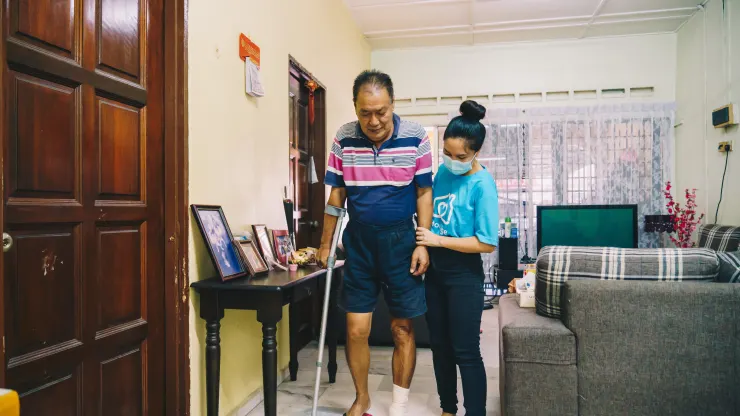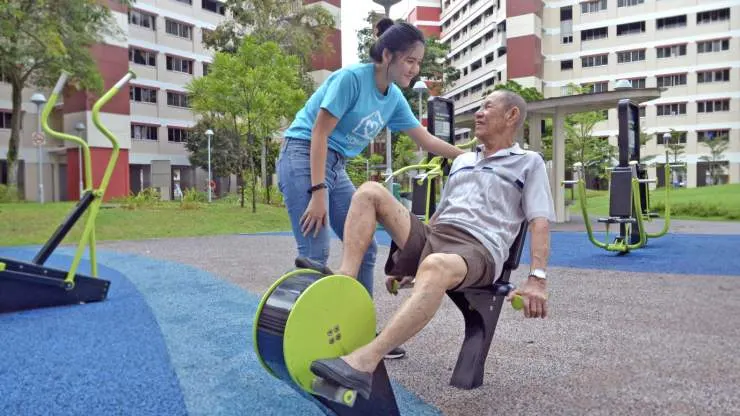After spending 15 years abroad, Singaporean entrepreneur Gillian Tee decided to return home in 2016 to be closer to her family.
It was what she called “the perfect storm.”
Three of her close relatives were living with chronic illnesses and Tee quickly discovered the “pain points” of caring for individuals who need specialized care.
“Let’s say you fell and broke your hip, the medical part is quite clear. You have to find specialists, you can go to… [a] public hospital or private hospital,” Tee said.
“But what happens when you need to come home, when you need to transition back to your community and your home, what is the care plan? What is the right thing to even think about, in terms of proofing the home, mobility aids?”

That’s when she decided to start Homage, a company that matches patients who need long-term home care with qualified caregivers.
Since 2017 when the company was founded, the startup has raised $45 million, she said naming notable investors such as Golden Gate Ventures Sheares and Healthcare Group — a Temasek wholly owned subsidiary, as well as early stage venture firm 500 Startups.
Homage is now valued at more than $100 million, according to Tee.
But this is not the 40-year-old’s first foray into entrepreneurship. She was a management consultant for Accenture when she chanced upon a book that changed the course of her career.
“I started off as a software developer and I was just very drawn to it because I liked building things. But what really hit me was this concept of application,” she told CNBC Make It.
How do I use technology to build something that people can use, and it impacts their lives?
Gillian Tee
CO-FOUNDER AND CEO, HOMAGE
She was referring to the book Founders at Work: Stories of Startups’ Early Days, written by Jessica Livingston, who co-founded seed stage investment firm Y Combinator.
“How do I use technology to build something that people can use, and it impacts their lives?”
And so began Tee’s entrepreneur journey, which includes spending two years in Silicon Valley, where she co-founded Rocketrip in 2013. It is a website that incentivizes business travelers to save their employers money on trip expenses.
The company raised $32 million — including $15 million from Google Ventures — before being acquired by Mondee Holdings in 2020.
This serial entrepreneur shares her top tips for running successful startup.
1. Know your market
Be it building an app for travel or health care, the business fundamentals never change, said Tee.
“You need to know your market really well. Know your cost drivers, growth drivers and demand drivers.”
Homage is currently in three markets — Singapore, Malaysia and Australia, where there are “unique characteristics” that connect well to the problem that the company is trying to solve, Tee added.
“We looked at caregiver shortage, the nature of the aging population and chronic illnesses — which interestingly, is not just caused by age, but highly correlated with urbanization.”
While users of Homage extend beyond seniors, the opportunity in eldercare technology continues to grow as people live longer. In Asia alone, one in four people will be over 60 years old by 2050, according to the Asian Development Bank.
However, Tee said she is “a big fan of going deep and not overspreading” the business.
“Focus is everything. We do have a very clear view of what the markets are, if we should expand to more [countries]. But right now the current focus is on deepening our current markets,” she added.
2. Build a good team
Business fundamentals are important, but entrepreneurs should “anchor first on people,” said Tee.
This has served Homage well in providing the best care for its clients, and for Tee, who had no prior experience in the health-care industry.
I try to do the best I can, but I bring on people who are much better than me.
Gillian Tee
CO-FOUNDER AND CEO, HOMAGE
“It’s important to lean on specialists for clinical governance and compliance. That’s why we have our director of nursing, for example, who has 20 years of experience across different medical settings,” Tee shared.
“A big part of what we do is we need to synthesize care quality with the product and technology. That’s the team you need to build — I try to do the best I can, but I bring on people who are much better than me.”
3. Focus on the ’100 good things’
Being an entrepreneur can be isolating, said Tee, especially so when you are a woman.
“You get snide comments, but of course, less so now because there’s a reputation and respect that’s been built up.”
But things were not always easy in the beginning. “For example, [a director] once told me, ‘You know, now I know why the newspapers feature you, because your eyes are so beautiful.’”
“This is my mantra like everything I go through: I have to be twice as assertive, more data-driven and be super sharp. I do think we [female entrepreneurs] have to do more to prove our point.”
Even so, Tee has learned to take things in her stride and lean on the people who matter.
“There’s 100 problems, but there’s also 100 good things. You got to really tune out the noise and be okay going through that intensity,” she added.
“It’s exhilarating in some ways, but tiring in many others. Lean on your team, be open, vulnerable, transparent with them. I think that’s the most important thing.”
4. Innovation drives impact
What does innovation mean to Tee? It’s about making an impact on users.
“The mission of Homage is so near and dear to me. At the end of the day, there’s nothing better than building something that people can get a solution out of,” she said.

Since 2017, Homage has provided over 1 million caregiving hours, with a team of 15,000 care professionals across its three markets, the company said.
Over the past two years, its business in Malaysia and Australia has also grown “700% year-on-year,” it added.
“Building an app that can mobilize people and then scaling that as a sustainable business, that drives me. It’s doing good, while doing well.”